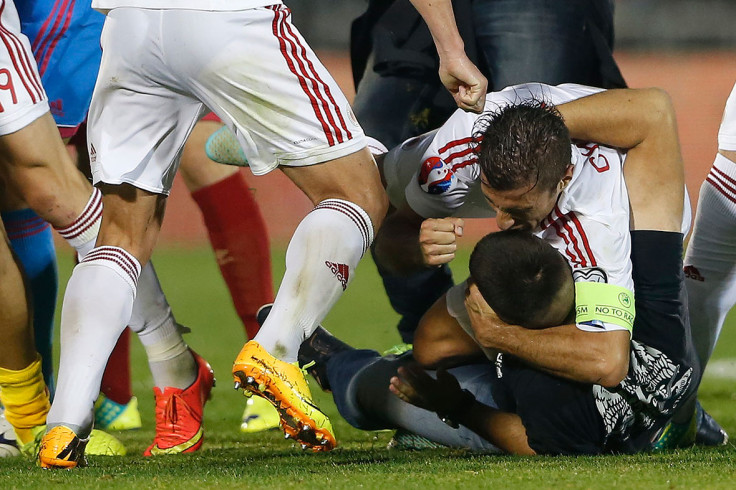Albania-Serbia Euro 2016 Qualifier: What Were Fans Fighting About?

The shocking scenes of violence at an international football match between Serbia and Albania – which had to be abandoned – have caught many by surprise.
But there have long been tensions between Albanians and Serbians. In recent times these have been flared by events in Kosovo, where the 2 million ethnic Albanians make up 90% of its population.
This particular brawl at the Euro 2016 qualifying match was triggered by a drone flying the flag of Greater Albania over the Partizan Stadium in the Serb capital of Belgrade. It was controlled by Orfi Rama, brother of the Albanian Prime Minister Edi Rama, as he sat in the VIP section. He was reportedly arrested.
Kosovo has an emotional hold over Serbs because it has historic and cultural importance to them. Many regard it as inherently Serbian territory, the demographic of which had changed because of its near 600-year colonisation by the Ottoman Empire, which caused an influx of Albanian Muslims.
It is against this backdrop of hundreds of years of tensions between Serb Christians and Albanian Muslims that modern troubles have erupted.
It all came to a head in the Kosovo War just before the millennium, when ethnic Albanians in Kosovo – supported by Nato and the Albanian army – fought for independence from what was left of Yugoslavia, the federal states of Serbia and Montenegro. Years of peaceful protest had failed.
Under the rule of Yugoslav president Slobodan Milosevic, a Serb nationalist and communist who came to power in 1987, much of the autonomy enjoyed by Kosovo was dismantled.
Serbia carried out ethnic cleansing in Kosovo as Milosevic sought to crush any rebellion. Its forces drove hundreds of thousands of ethnic Albanians into neighbouring territories. Some were murdered and many suffered atrocities at the hands of the Serbs, such as rape and torture.
Eventually, the Serb army was driven from Kosovo and the United Nations took control of the state. UN peacekeepers remain in Kosovo today to watch over the minority of Serbs who still live there and prevent any fresh violence.
Milosevic and some of his lieutenants ended up in the Hague on war crimes charges over what happened on his orders. He died in 2006 before the end of his trial.
In 2008, Kosovo declared independence from Serbia. But it sits in a sort of diplomatic no-man's land. Its independence has been recognised by the United States and most members of the European Union, but not by Serbia or Russia.
Progress has been made. Serbia recognises the autonomy of Kosovo and its institutions. But it still regards Kosovo as a province of Serbia, and the cultural significance of this ethnic powderkeg continues to foster tension and hatred.
© Copyright IBTimes 2025. All rights reserved.




















